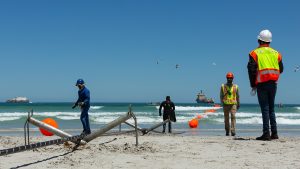By Chisom Nwatu
MTN Group has received a 45,000-kilometre subsea cable to connect African countries to Europe and the Middle East.
A statement by the leading telecom firm, said 2Africa subsea cable system will support western and eastern sides of Africa once complete in 2023 and 2024, respectively.
It noted that the subsea cable named 2Africa is a joint project of MTN South Africa and MTN GlobalConnect as well as a partnership with a consortium, which includes MTN GlobalConnect, China Mobile International, Meta French telecoms company Orange SA, Telecom Egypt, Vodafone, Mauritius-based infrastructure provider WIOCC and Saudi Arabia’s center3.
The development is coming a year after Google launched Equiano undersea cable on the continent.
The subsea cable project targets delivering a much-needed internet capacity, reliability, and improved internet performance across large parts of Africa, underpinning the further growth of 4G, 5G, and fixed broadband access for millions of people.
MTN said the subsea cable would lay the foundation for improved global internet access, connecting people and continents. Also, the subsea cable will play a big part in delivering much-needed capacity in Africa from Europe, the Middle East, and Asia.
MTN further added that the 2Africa landing is one of several cable landings taking place across 46 locations in 33 countries.
Ralph Mupita, chief executive, MTN Group, speaking on the partnerships as well as the subsea cable project, said it would deepen and improve the continent’s internet adoption.
“Strategic partnerships, such as the one we have with the 2Africa consortium, will help us accelerate and deepen internet adoption and socio-economic progress across the African continent. Data traffic across African markets is expected to grow between four and five-fold over the next 5 years, so we need infrastructure and capacity to meet that level of growth and demand,” Mupita said.

He also noted that the cable landing adds to another milestone to the digital railroads they are building around Africa, making telecommunications more accessible and available.
Frédéric Schepens, CEO, MTN GlobalConnect, in his remark, said the initiative complements its terrestrial fibre strategy to connect African countries and to the rest of the world.
“We are building scale infrastructure assets to meet the explosive growth in data traffic and accelerate the digital economy on the continent by creating a pan-African fibre railroad driving affordable connectivity,” he said.








